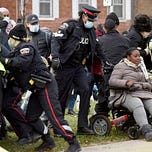Independent MPP Sarah Jama holds power at housing encampment clearance in Hamilton. Credit: Sarah Jama
I’m very excited to welcome professor Andrew Hathaway from the Department of Sociology and Anthropology at the University of Guelph back to Small Change to discuss why policing in Canada needs to be reformed.
Andrew and I begin with a brief overview of the role of police officers and police departments in Canada before moving onto the fact that I believe police don’t actually prevent crimes.
In fact, I would argue, police officers and departments, often don’t solve crimes once they’ve been committed.
I’m thinking of an acquaintance’s daughter whose home was broken into. A few days later, walking in her Toronto neighbourhood she saw a man pushing a grocery cart containing her computer and other belongings as well as multiple wallets and wide variety of obviously stolen items.
When she called the police, they didn’t take any information and weren’t interested in dealing with the situation.
Or, all the women whose rapes were not followed up by police. Seven years ago, Halton Regional Police Service (HRPS) had one of the highest rates in Canada for dismissing sexual assault claims as being "unfounded.”
Almost one in three reports was labelled "unfounded" and the investigations dropped. That’s hundreds of women whose rapes were not followed up because officers lacked trauma informed training and relied on their gut instincts to decide if a woman was telling the truth.
Diana Tikasz, MSW, RSW and Coordinator of the Sexual Assault Domestic Violence Care Centre at Hamilton Health Sciences, understands the brain under trauma and why victims of violence often engage in behaviour that seems counter intuitive — think Jian Ghomeshi and the women he abused who continued to interact with him.
But Halton officers, at that time, had not had the benefit of any trauma informed training let alone Tikasz’s expert training.
And, quite frankly, officers are often the perpetrators of the very crimes they are employed to prevent and solve.
Take Dafonte Miller, 19-years-old at the time, who was brutally beaten by off duty Constable Theriault and his brother blinding Dafonte in one eye. That happened in Whitby, Ontario on December 28, 2016.
Constable Theriault, who worked for Toronto Police Services, and whose father John Theriault was a Detective with Toronto Police Services, was given nine months in prison followed by 12 months probation and a five-year weapons prohibition.
Theriault resigned from Toronto Police Services to avoid facing a disciplinary tribunal.
Or, the women I met at Milton Courthouse in 2006 while I was going through my own divorce. We spoke often while waiting in the common area just to pass the time.
Then, one day my lawyer asked if I knew the woman I had just been speaking with. I didn’t. I only knew her first name, that she had kids and that her soon to be ex brought his new girlfriend with him to court.
My lawyer told me she was the wife of a cop who was known to physically abuse her. In fact, the cop had beaten his wife after she reported one case of assault to the police and told her he’d do it again if she followed through with the charges and testified against him in court.
Or, how about peaceful Palestinian protestors who have been targeted by the heavily resourced Hate Crimes Unit that engaged in surveillance, night raids and trumped-up charges that are now being withdrawn.
Find more in Martin Lukacs Breach article, Inside the ‘shocking’ police operation targeting pro-Palestine activist in Toronto.
Or, the fact that over 90 per cent of the time Hamilton police officers execute search warrants via no-knock raids when it has neither been necessary nor included in the issued warrant.
For those unfamiliar with no-knock raids, Canadian police officers are bound by law to knock on a home’s door, to then identify themselves as police and to wait for someone to answer before executing a search warrant.
No-knock raids are supposed to be rare because they create a higher risk of things going sideways and ending badly for those residing inside the home and when used inappropriately, violate Charter rights.
I think there are a lot of people out there who don’t believe policing, as it exists today, makes society safer or actually protects our Charter Freedoms.
On the other hand, there are those, mainly white folks and mainly men, who can’t imagine defunding the police because they think that would lead to absolute chaos, threaten their property as well as their very existence.
So, it’s imperative to discuss, who are the police really protecting and why?
It is also important to discuss what reforming, or reconfiguring, police work and police funding would look like if politicians were to fund basic policing needs while redirecting money to properly fund the social determinants of health; robust, free public education from kindergarten to post-secondary; and thriving local communities including livable wages and free childcare.
I’m calling this paradigm shift reforming police work, but most folks know it by the terms police abolition and defunding the police.
In April 2023, Ontario eliminated the post-secondary education requirement to become a police officer and cut tuition fees at the Ontario Police College.
Ford did this to get more police officers into communities and on the street to deal with auto thefts, assaults, break-and-enters and random acts of violence.
In 2023 the Ontario Police College added 140 new recruits with 420 expected to graduate by the end of 2024. Cadets must complete 66 days of basic constable training.
Apparently, life experience is good enough for Solicitor General Michael Kerzner who said, “I don’t think bringing an arts degree is necessarily the criteria to go to Ontario Police College and to be a cadet,” during an interview when the change was announced.
I have to wonder how much life experience does a 17-year-old bring to the table? Or, even someone in their late 20’s who hasn’t had a lot of life and multi-cultural experience?
Without a degree say in sociology, psychology or even criminal justice do these cadets have the critical thinking skills to be able to deal with complex mental health issues while performing mental health checks; identifying potential femicide victims before they are murdered; taking seriously intimate partner violence, racism, poverty, unhoused folks along with the whole host of social ills that have been downloaded onto police?
Tuition of $15,000 per year for police college has been waived despite massive cuts to post-secondary institutions under Ford.
In fact, the province is paying over $20 million to cover tuition over three years starting with the 420 cadets.
Meanwhile, recommendations from The Mass Casualty Commission, the inquiry into the 2020 mass shooting in Nova Scotia that left 22 dead, recommended overhauling police training right across Canada and basing it on Finland’s model.
The commissioners’ recommendations echo recommendations made by previous inquiries, reviews and reports into policing in Canada. Yet, none of the recommendations have been acted on.
Sir Wilfrid Laurier University actually offers a degree in policing and experts like Professor Scott Blandford, a 30-year police veteran and professor at Laurier says six months of training is inadequate and that a university degree should be the minimum.
Research has shown that post-secondary educated officers use force less often, are more tolerant of diversity and more inclusive of the communities that they police.
The Mass Casualty Commission report noted three years of education would better equip police officers to do their jobs at the beginning of their careers in areas where the police perform poorly, such as investigating sexual assault complaints, criminal harassment, uttering threats, and recognizing and responding to gender-based and intimate partner violence.
It also recommended adopting the Finnish model of policing which values communication and establishing trust.
So, why are Doug Ford and Solicitor General Kerzner going against the recommendations of Canadian experts and ignoring the Finnish model?
In 2023 alone, the Toronto Police Service budget was increased by $48.3 million. That’s an increase of 4.3 per cent over the 2022 budget which may not sound like much, but it brought the total 2023 operating budget to $1.16 billion.
The 2024 Operating Budget is $1,361.5 million gross and $1,186.5 million net which represents a $20 million net, or 1.7 per cent, increase over 2023.
It’s interesting the dollar amounts are stated in terms of thousands of millions when reality is $1,361.5 million is actually $1.3 billion and $1,186.5 million is really $1.8 — almost $1.9 —billion a much more impactful way of clearly stating the Toronto Police Services budget.
In 2024, Hamilton Police Services proposed a budget increase of over $16 million more than the 2023 budget. That brought the total police budget to $214 million in 2024.
Police budgets are expanding exponentially while social services, education and healthcare are being cut by the province and municipalities.
Ontario is in the midst of a housing crisis, opioid crisis, mental health crisis, healthcare crisis, femicide epidemic and housing affordability crisis. Yet, the Ford government fails to even acknowledge these polycrises let alone address them through policy.
Hathaway and I discuss how the prospect of diverting funds from policing to directly fund the social determinants of health would help create more equitable, safe communities which won’t have to rely on militarized police.
In the documentary Power – available free on Netflix – Frederick Douglas is quoted as stating, “Power concedes nothing without demand.”
And looking to Canada, when I write about the 1919 Winnipeg General Strike, I usually include that on June 21, 1919 -- Bloody Saturday -- 15-year-old Tommy Douglas was watching the brutal police attack on strikers unfold from a rooftop. That scene galvanized his commitment to workers because he realized that the government’s response to shut down the city-wide strike was part of a pattern where government is always prepared to resort to violence to break the back of organized opposition to capitalist oppression.
Hear Helen Armstrong, Labour Union Organizer (1875 – 1947), recall the Winnipeg General Strike (1919).
At this moment in history, it is imperative to ask, who really has the power in our society -- the police or the people?
Hathaway’s answer may surprise some of you.
Additional material:
Power because increasingly militarized policing is not just a USA issue, it’s well established in Canada.
The Skin We’re In by Desmond Cole.
Professor of Political and Canadian Studies at Mount St. Vincent University, Dr. El Jones was asked to work on a report of recommendations for the Halifax Regional Police with regards to what defunding the police could actually look like. Dr. Jones sat down with President of Black Lives Matter New Brunswick Matthew Martin and Dr. Timothy Christie, co-hosts of NBWA: New Brunswickers Want Action, to discuss the report and the impact it could have on communities across Canada, including in New Brunswick. Have a listen here.
NFB film When Two Cultures Collide: This documentary is an inquiry into what came to be known as Saskatoon's infamous "freezing deaths," and the schism between a fearful, mistrustful Indigenous community and a police force harbouring a harrowing secret.
Tasha Hubbard’s NFB film “nîpawistamâsowin: We Will Stand Up” follows Colton Boushie’s family as they demand action on systemic racism within the Canadian justice system. This must see documentary is available free on the National Film Board (NFB) website here.
Thanks to everyone who read today’s article and listened to my podcast. With your continued support, a little Nicoll can make a lot of change.
Music: Real Estate by UNIVERSFIELD is licensed under a Attribution 4.0 International License. freemusicarchive.org.
*Be sure to download the Substack app to get the most from your podcast experience.













Share this post